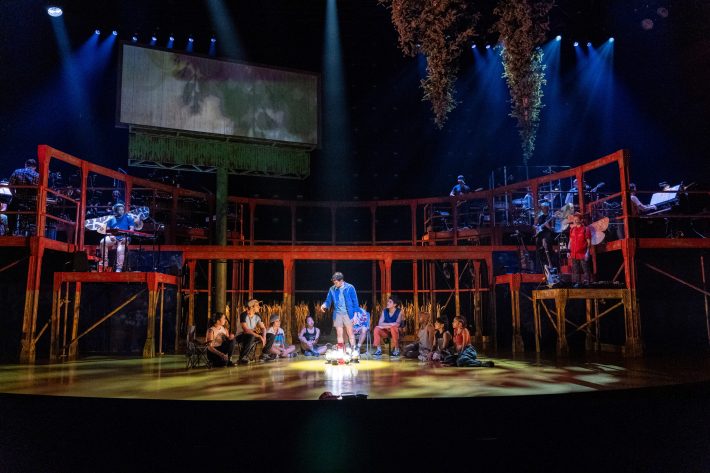How do you take an album like Sufjan Stevens' Illinois — concerned with the undead, first loves, impending heartbreak, field trips with stepmoms, and John Wayne Gacy — and adapt it into a stage show? For choreographer Justin Peck and playwright Jackie Sibblies Drury, you set the music around a bonfire, turn these characters into ghost stories, and bring them to life through one of the oldest and most expressive art forms: dance. With Illinoise, they adapt the 2005 album into a play fit with live singing and dancing.
The production, which sold out its run in Chicago last year, is showing at New York's Park Avenue Armory through Saturday before reopening at Broadway's St. James Theatre for a 16-week run starting April 24, a day before this year's deadline for Tonys consideration. Which category it might fit into is up for debate; the show's official website designates it as a musical, while Peck admitted to Pitchfork last year, "I couldn’t tell you if it’s a concert or dance-theater piece or musical. It’s somewhere amidst all that but feels like its own thing." Per The New Yorker, "It’s not quite a musical, a ballet, or a play, but it’s close."
However you categorize it, Illinoise is (at least) not a typical musical, in which the same company of performers handles the dancing, singing, and acting. Instead of a script, Drury reordered the album into a story told entirely through Stevens' song lyrics — really a series of stories told around the fire, before a central narrative emerges later in the show. (An extensive diary within the official program works as supplemental material.) The music, arranged by pianist Timo Andres, is performed by a band perched above the stage, with spruce trees hanging overhead. Three voices — Elijah Lyons, Shara Nova, and Tasha Viets-VanLear — handle Stevens' lyrics and vocal flourishes wonderfully, singing with soft grief in quiet moments like "Casimir Pulaski Day" and with verve on the bittersweet yet hopeful "Chicago."
With each story, one dancer in the cast acts as a bard, suddenly transforming the stage as the surrounding dancers follow suit. Their bodies mimic the respective Stevens tracks' rhythms and grooves: the haunting yet funky staccato of "They Are Night Zombies!!" or the thumping rowdiness of "The Man Of Metropolis Steals Our Hearts." Peck’s choreography transforms "Jacksonville," a song about a town believed to be named after either President Andrew Jackson or A.W. Jackson, a Black preacher. At times, it can feel like his choreography reverberates off itself; even moments of stillness vibrate with kinesis. Embellished with percussion directly from tap dancer Byron Tittle’s feet, "Jacksonville" asserts its stance on the town’s namesake (and if that’s not clear enough for you, the stage’s billboard illuminates a sign with A.W. Jackson’s name spray painted over the former president’s).
And while this opening act is convincing and entertaining enough, the bulk of Illinoise follows Henry (Ricky Ubeda) throughout his adolescent and adult lovers, from Chicago to New York City and back. The several pas de deux featured throughout the rest of the show present Peck at his best, crafting playful, gestural, and at times flirtatious movements that spell out Henry's coming-of-age. In these moments, it’s evident that Peck has loved this album since he was 17.
One of the most affecting segments of Illinoise is the duet on "Casimir Pulaski Day" between the couple Carl (Ben Cook) and Shelby (Gaby Diaz). Already a devastating song, its grief is amplified by the delicate interactions between Cook and Diaz, which teeter between stability and destruction before the track’s quiet end. Despite the complex choreography, the dancers move softly and carefully, as if handling something fragile. It's reminiscent of Peck’s direction on the National’s 2017 video for "The Dark Side Of The Gym," in which he and his wife bound across a balloon-filled gymnasium.
What made Illinoise so captivating was how the company could feel like your friends, zealously narrating and gesticulating through tales of serial killers and love triangles. It was campy but not to a fault, containing a sense of childlike wonder that began in the first act and expanded to its conclusion with "The Tallest Man" and "Out Of Egypt." When the source material of a show like this is so widely beloved, it’s equally easy to disappoint and satisfy its most vehement fans. But every minute of Illinoise felt like a labor of love, one where the company and the audience felt evenly matched in their admiration for Sufjan Stevens' work.

We rely on reader subscriptions to deliver articles like the one you're reading. Become a member and help support independent media!






